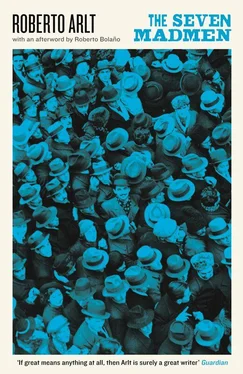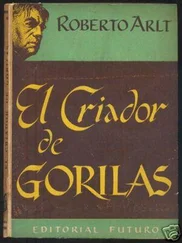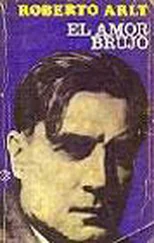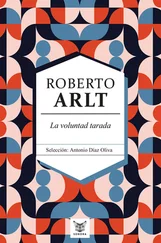“Light the lamp.”
Light poured down from the ceiling. Erdosain stood staring at her as she sat on the sofa. He murmured shyly: “Shall I sit beside you? I couldn’t sleep.” Hipólita made room for him. As he sat next to her, Erdosain found it impossible to keep his hands still, and caressed her forehead with his fingertips.
“Why are you the way you are?” he asked.
Hipólita looked at him coolly.
Erdosain stared at her for a moment in mute despair, then reached out for her slender hand. He was about to raise it to his lips when some strange force prevented him doing so. With a sob, he slumped on her lap.
He started weeping uncontrollably as she sat straight-backed, watching his body shaking without any sign of emotion. He wept blindly, his life a knotted ball of hopeless fury; he could not cry out in pain, but choking back the rage only served to increase his dreadful sorrow; suffering poured out of him in endless waves, drowning him as it sobbed from his throat. He broke down in this way for several minutes, biting his handkerchief to keep from screaming, while her silence was a soft cushion for his exhausted spirit. Slowly this intense agony wore itself out; the last tears welled up in his eyes, while his breathing was a confused rattling sound in his chest. He found comfort in being stretched out like this, wetcheeked, on a woman’s lap. He felt completely drained; the figure of his distant wife finally disappeared from the surface of his torment; and as he lay there a twilight calm descended on him, an acceptance of whatever disasters were in store for him.
He raised his face, red from the tears and imprinted with the folds of her dress.
She was still eyeing him coolly.
“So you’re sad?”
“Yes.”
They both fell silent as a violet flash of lightning lit the corners of the dark patio outside. It began to rain.
“Should we have a drink of maté?”
“Yes.”
He boiled the water without saying anything more. As he poured the maté leaves into the container, she stared absent-mindedly at the rain beating on the windows. Smiling through his tears, he said:
“You’ll like the way I make it.”
“Why were you so sad?”
“I don’t know … a feeling of anguish … I haven’t felt at peace with myself for so long now.”
He was drinking the maté in silence. Hipólita stood out perfectly against a corner of peeling wallpaper, wrapped in her fur coat and with the two bands of her hair covering the tips of her ears.
Erdosain smiled a childish grin, and confessed: “When I’m on my own, I drink a lot of maté.”
She smiled in a friendly way. She was leaning forward, one leg crossed over the other, elbow cupped in her hand as she sipped slowly through the nickel-plated drinking straw.
“Yes, I felt at the end of my tether,” Erdosain said again — “but how cold your hands are! Are they always like that?”
“Yes.”
“Can I take your hand?”
Hipólita straightened up and held it out to him with an almost regal gesture. Erdosain took hold of it gently, then raised it to his lips. She stared at him for a long moment, all the coldness of her eyes melting in a sudden warmth that brought colour to her cheeks. All at once Erdosain remembered the chained-up prisoner, but this did not entirely demolish the pale sense of hope being kindled in him. He said:
“Listen … if you asked me here and now to kill myself, I would. I’m so happy!”
The warmth that an instant earlier had lit the depths of Hipólita’s eyes was snuffed out, replaced once again by her cold gaze. She stared at him intrigued.
“I’m being serious. I’m going to … no. It’s better for you to ask me to kill myself … tell me, don’t you think it would be better if certain people just ceased to exist?”
“No.”
“Even though they do terrible things?”
“That’s in God’s hands.”
“Then it’s not worth talking about it.”
Again they sat drinking their maté in silence. This gave him the chance to enjoy the spectacle of this red-headed woman dressed in her fur coat, her transparent hands clasped round the knee of her green silk dress.
Unable to contain his curiosity, he burst out:
“Is it true you were a maid?”
“Yes … what’s so strange about that?”
“It’s odd.”
“Why?”
“It just is. Sometimes I think I’m going to find what’s missing in my life in someone else’s. I feel that some people have found the secret of happiness … and if they would only tell us that secret, we could be happy too.”
“But my life is no secret.”
“Have you never felt how strange life is?”
“Yes, of course.”
“Tell me about it.”
“It was when I was a young girl. I worked in a beautiful house on Alvear Avenue. There were three daughters and four servants. I would wake up in the morning and still could not believe I was the one moving in and out of all this furniture that wasn’t mine, among people who only spoke to me to give orders. Sometimes I felt everyone else was well-anchored in their existence, in their houses, but I was loose, only attached to life by a thread. I heard other people’s voices in my ears like when you’re half-asleep and you’re not sure whether you’re dreaming or it’s real.”
“That must be really sad.”
“Yes, it’s sad to see other people happy, to see they don’t understand that you are unhappy and always will be. I remember that when it was time for my afternoon nap I would go to my room and instead of mending my clothes or whatever, I would sit thinking: ‘Am I going to be a maid all my life?’ It wasn’t the work I found tiring, but this constantly going over things in my mind. Have you noticed how sad thoughts refuse to go away?”
“Yes, that’s true. How old were you then?”
“Sixteen.”
“And you hadn’t slept with a man?”
“No … but I was angry … angry at the thought of being a maid all my life … and there was one thing that stuck in my mind more than anything else. It was one of the sons. He was engaged to be married, and he was a staunch Catholic. I caught him several times making love to a cousin of his who I now realise must have been his fiancee: she was very sensual, and I always asked myself how he could reconcile his Catholicism with this disgusting way of carrying on. Despite myself, I ended up spying on him … although he was always the perfect gentleman with me, not at all like he was with her. Later on I realised that what I had been looking for was … but by then it was too late … I was already working in another house …”
“And then?”
“I was still haunted by my obsession. What did I want from life? I hadn’t the slightest idea. Everybody treated me very well. Since then, I’ve heard people do down the rich … but I never saw their cruelty. That’s just how things were. They had no need to be cruel, did they? They were the daughters, and I was the maid.”
“And then?”
“I remember that one day I was on a tram with one of my employers. Opposite us a pair of young men were chatting. Have you noticed how some days there are certain words which explode in your ears like bombs … as if you had always been deaf and all of a sudden you really hear people speak for the first time? That’s how it was. One of the young men said: ‘If an intelligent woman, no matter how ugly, decided to sell herself, she would get rich and if she was careful not to fall in love with anyone, she could rule a whole city. If I had a sister, that’s what I’d tell her.’ His words made me freeze in my seat. They drove away all my shyness, so that by the time we got off the tram I felt it was not someone else who had spoken these fateful words, but me, although I had forgotten them until that moment. For days after that, I was troubled by the problem of how one actually goes about selling oneself.”
Читать дальше











